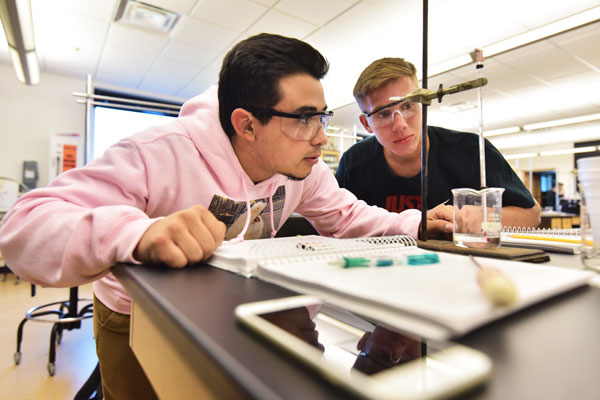About Chemistry
Get the Know-How You Need
Our expert faculty will guide you from research to discovery.
Picture yourself in our professionally-equipped laboratory, navigating pathways of discovery. Our dedicated faculty will guide you as you conquer advanced instrumentation that shapes modern chemistry. Here's just a few examples—delve into molecular analysis with the MVR spectrometer, unraveling the enigmatic properties of compounds and exploring the mesmerizing world of molecular structure. Experience the vibrant realm of chemical interactions with the FT-IR spectrometer, deciphering the intricate language of molecules through vibrational signatures.

Why ACS?
We offer two emphases within the American Chemical Society, one of the largest scientific societies in the country: ACS Chemistry and ACS Environmental Chemistry. Both of these emphases show employers the academic rigor and high-quality program you've achieved at UW-Green Bay. You'll also complete at least 400 hours of experience in the lab, building your skills in a wide variety of scientific concepts.
Emphases
Your choice of emphasis will help pave the path toward your career.

General Chemistry
Discover more about the world around you. Our emphasis in chemistry prepares you for careers in medicine, pharmacy, chemical engineering, forensics, teaching and more.

ACS Chemistry
Compared to General Chemistry, ACS Chemistry is more intensive, with an emphasis on intellectual, experimental and communication skills.

ACS Environmental Chemistry
Create a better world and a better career with this emphasis. Your research on how chemicals affect our planet will help inform better decisions.

Biochemistry
Biochemistry fills in the blanks between biology and chemistry. But it’s also much more than that.




We've Always Been Green
Expect nothing less from the original ECO-U®.
Our program commits to sustainable practices in all laboratory classes and in their research programs. As the original Eco U, we aim to follow the 12 principles of green chemistry: pollution prevention; atom economy; less hazardous chemical syntheses; designing safer chemicals; safer solvents and auxiliaries; designing for energy efficiency; using renewable feedstocks; reducing derivatives; catalysis; designing for degradation; real-time analysis for pollution prevention; and using inherently safer chemistry for accident prevention.
Testing Out of Intro Chemistry
If you want to test out of CHEM 211/213 and/or CHEM 212/214, you should arrange to take the appropriate College-Level Examination Program (CLEP) exam. Students earning a score of 50 or higher on the CLEP exam will receive credit for the corresponding course.

Professor Support
"Don’t be afraid to reach out for extra help. I’ve met with my professors and advisors more times than I can count, for all sorts of things—homework help, schedule clarity, you name it. There are lots of people that are rooting for your success, you just have to find them!"
Nora Buchholz '24
Pharmacy Technician at St. Vincent Hospital

Let's Connect
With research interests in using chemicals in fruits and plants to prevent cancer and heart disease, Professor Julie Wondergem is committed to using chemistry to improve the world. Got questions? She’s got answers!